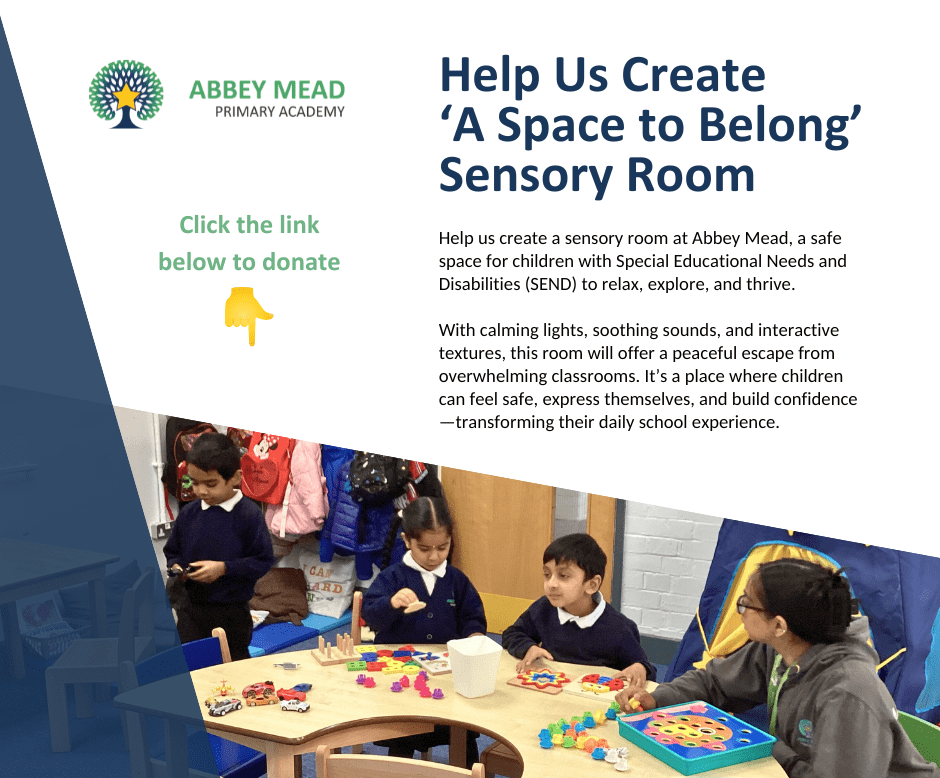Hi, my name is Gary Aldred and I am the Safeguarding Lead at Abbey Mead Primary Academy.
My role is to ensure the welfare and safety of all children who attend Abbey Mead. At Abbey, we believe that pupils have a right to learn in a supportive, caring and safe environment which includes the right to protection from all types of abuse; where staff are vigilant for signs of any pupil in distress and are confident about applying our safeguarding processes to avert and alleviate any such problems. Through regular training, all staff are equipped with the necessary skills and knowledge to safeguard pupils from all forms of abuse.
Sometimes, we may need to share information and work in partnership with other professionals when there are concerns about a child’s welfare. We will ensure that concerns about our pupils are discussed with his/her parents/carers first unless we have reason to believe that such a move would be contrary to the child’s welfare. If a member of staff is concerned about a child’s welfare, they will record their concern, and any observations or conversations, and report to one of the DSLs as soon as possible.
If you are ever concerned about the safety or well‐being of someone at our academy, please talk to myself or one of my deputy safeguarding leads immediately.
The Mead Educational Trust ensures children learn in a safe, caring and enriching environment. Children are taught how to keep themselves safe, to develop positive and healthy relationships, how to avoid situations where they might be at risk including by being exploited.
Our school ensures children learn in a safe, caring and enriching environment. Children are taught how to keep themselves safe, on and offline, to develop positive and healthy relationships and how to avoid situations where they might be at risk, including by being exploited.
Our school has a statutory responsibility to share any concerns it might have about a child in need of protection with other agencies, and in particular police, health and children’s services. Schools are not able to investigate concerns but have a legal duty to refer them. In most instances, the school will be able to inform the parents/carers of its need to make a referral. However, sometimes the school is advised by Children’s Social Care or the police that the parents/carers cannot be informed whilst they investigate the matter. We understand the anxiety parents/carers understandably feel when they are not told about any concerns from the outset. The school follows legislation that aims to act in the best interests of the child.
Safeguarding Team
 | Mr Aldred Designated Safeguarding Lead |
 | Mrs Pickard Vice Designated Safeguarding Lead |
 | Miss Tuffey Vice Designated Safeguarding Lead |
 | Miss Saujani Vice Designated Safeguarding Lead |
 | Miss Cogan Vice Designated Safeguarding Lead |
 | Miss Kaur Vice Designated Safeguarding Lead |
 | Mrs Martin Vice Designated Safeguarding Lead |
 | Miss Healey Vice Designated Safeguarding Lead |
 | Mrs Burgess Vice Designated Safeguarding Lead |
If you have any safeguarding concerns about a child at Abbey Mead Primary Academy outside of school hours, please call Social Care on 0116 4541004 or the NSPCC on 0808 800 5000. Concerns can also be sent to school via our email address [email protected] This email will be sent to all safeguarding leads at the school and will be monitored throughout the year.
We have some e-safety information available for parents on our online safety page on the website. Please be sure to visit this link if you would like some information or guidance on keeping your child safe online
AMPA TMET Safeguarding and Child Protection Policy v 16.0
Early Help
What is Early Help?
Early Help means providing help for children, young people and families as soon as problems start to emerge or where it is likely that issues will impact negatively on children’s outcomes.
Early Help…
- is for children of all ages and not just the very young,
- can be very effective in supporting a child, young person and/or their family to step down from statutory services as well as preventing the escalation of issues.
- is important because there is clear evidence that it results in better outcomes for children.
Leicester City Council recognises that Early Help is a term that describes much of the everyday work of schools.
Early Help in Leicester
The vision of all partner organisations working with children and families in Leicester is to improve children’s lives by working in partnership to raise aspirations, build achievement and protect the most vulnerable.
This is based on the belief that:
- Children, young people and families develop resilience if there are protective factors in place such as: a positive relationship with an adult; good literacy and communication skills; good school attendance; and, parents in or actively seeking/ready for work
- Children’s needs are best met when help is offered in a universal setting within a socially mixed group and early on when problems start to emerge
- Children and young people’s needs are best met when addressed in the context of the whole family, meaning that parents/carers/siblings’ needs are addressed with consent as part of a holistic and integrated Early Help response
Early Help services should support and strengthen families so that they can thrive.
The Role of Schools
Day to Day Support
Most families, most of the time, can get on with their lives quite happily with little or no outside help. If they need help it is usually provided by universal services, such as schools.
Focused Pastoral Support
All families can have times, however, when difficulties arise and they either may not recognise it or may not know how to start putting things right. Schools play a role in supporting families to address these difficulties through more focused pastoral support, which might include bringing in support via an external agency.
Early Help Assessment
For those children and families whose needs and circumstances make them more vulnerable, or where schools need the support of other agencies to meet the needs of the family, a coordinated multi-agency approach is usually best. In Leicester this is achieved through undertaking an Early Help Assessment and assigning a Lead Practitioner to work closely with the family to ensure they receive the support they require. Schools should be a key partner in any multi-agency work to support families.
The following four commitments are the core elements to Abbey Mead Primary Academy’s Early Help Offer.
By implementing these commitments Abbey Mead Primary Academy aims to ensure:
- Pupils, parent/carers and staff are clear on the Early Help support available through the school
- Clarity for partners, supporting improved multi-agency working
- Delivery approaches of Early Help support for more vulnerable families are up to date with local offers
- Commitment to the personal development and well-being strand of the Ofsted Framework


 Learning Every Minute of Every Day
Learning Every Minute of Every Day